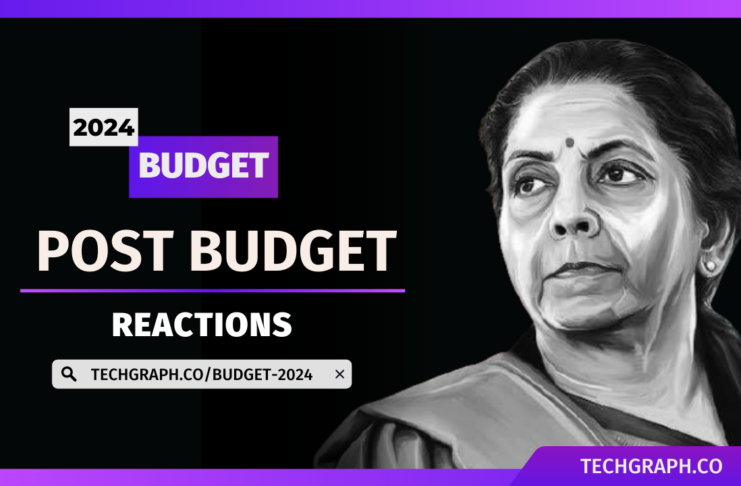In response to Finance Minister Nirmala Sitharaman’s interim budget presentation on Thursday, key players in the electric vehicle (EV) industry have offered their perspectives on the proposed measures. The budget, described as a “vote-on-account,” outlines significant allocations and initiatives aimed at fortifying the EV ecosystem and supporting related infrastructure development.
Here’s a breakdown of their perspectives:
Sameer Aggarwal, CEO & Founder, Revfin
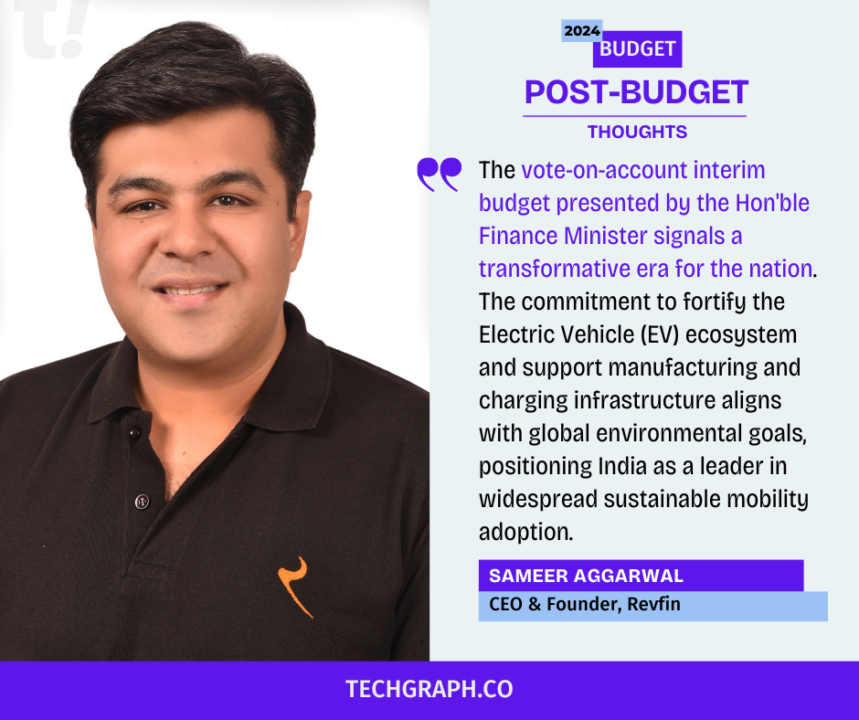
The vote-on-account interim budget presented by the Hon’ble Finance Minister signals a transformative era for the nation. The commitment to fortify the Electric Vehicle (EV) ecosystem and support manufacturing and charging infrastructure aligns with global environmental goals, positioning India as a leader in widespread sustainable mobility adoption. Continued focus on rural economy support, youth skill development, and gender-inclusive initiatives reflects a holistic approach toward inclusive and sustainable growth. Skill India Mission’s success in training 1.4 crore youth strengthens the workforce for evolving job demands.
Abhimanyu Singh, Co-founder & CTO, ParkMate
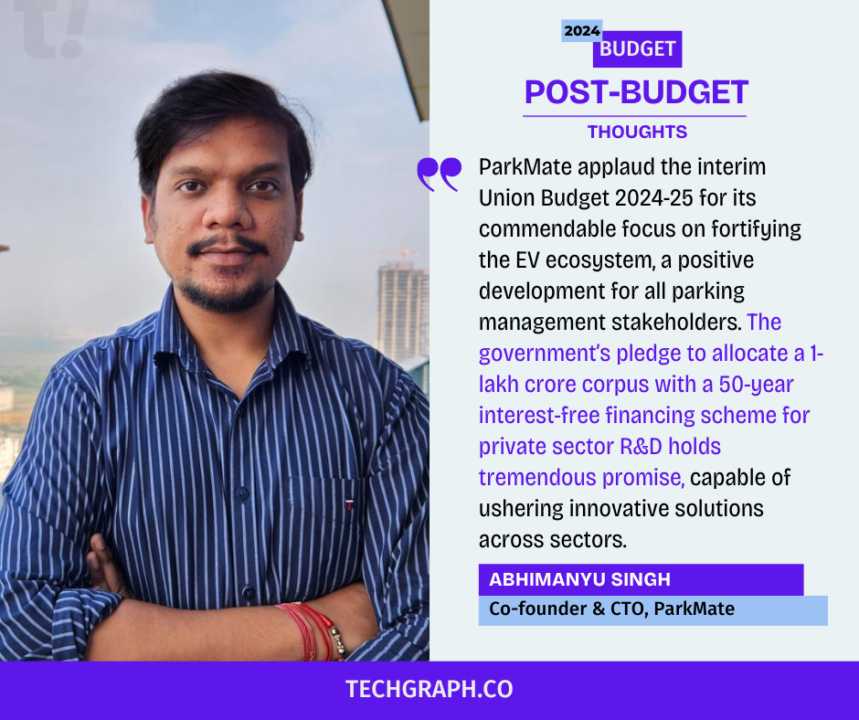
ParkMate applauds the interim Union Budget 2024-25 for its commendable focus on fortifying the electric vehicle ecosystem, a positive development for all parking management stakeholders. The government’s pledge to allocate a 1-lakh crore corpus with a 50-year interest-free financing scheme for private sector R&D holds tremendous promise, capable of ushering innovative solutions across sectors.
Importantly, this substantial financial commitment not only empowers ongoing research and development initiatives but also lays the foundation for transformative, long-term projects. In addition, the extension of tax benefits to startups until March 31, 2025, reflects the government’s ongoing support for entrepreneurial ventures, including those in the auto-tech space like ParkMate
Kartik Narayan, CEO, TeamLease Services
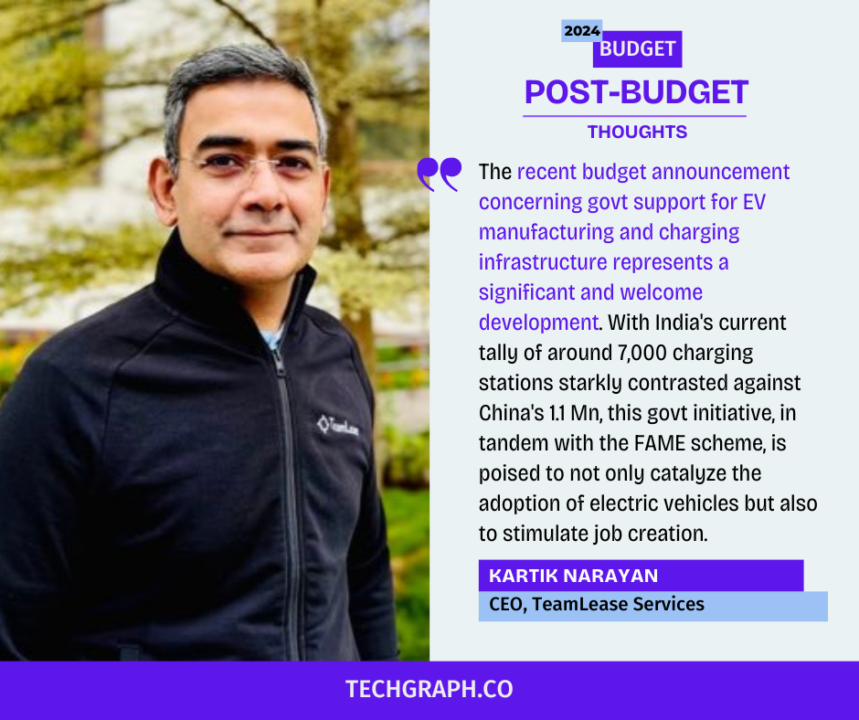
The recent budget announcement concerning government support for electric vehicle (EV) manufacturing and charging infrastructure represents a significant and welcome development. With India’s current tally of around 7,000 charging stations starkly contrasted against China’s 1.1 million, this government initiative, in tandem with the FAME scheme, is poised to not only catalyze the adoption of electric vehicles but also to stimulate job creation within the entire ecosystem of charging infrastructure.
Atul Gupta, Co-founder & Director, e-Sprinto
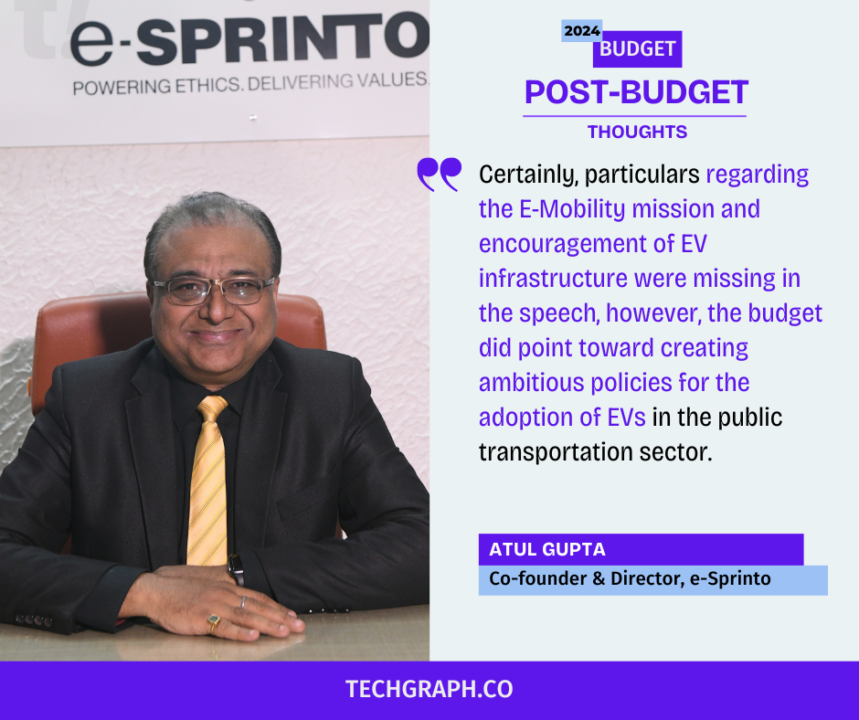
Certainly, particulars regarding the E-Mobility mission and encouragement of EV infrastructure were missing in the speech, however, the budget did point toward creating ambitious policies for the adoption of EVs in the public transportation sector. Furthermore, since the budget has circumscribed the requirement to strengthen the manufacturing of EVs and infrastructure, we can be sure that it stands high on the government’s agenda, and we do expect supporting policies to follow soon.
Dinesh Arjun, Co-founder & CEO, Raptee Energy
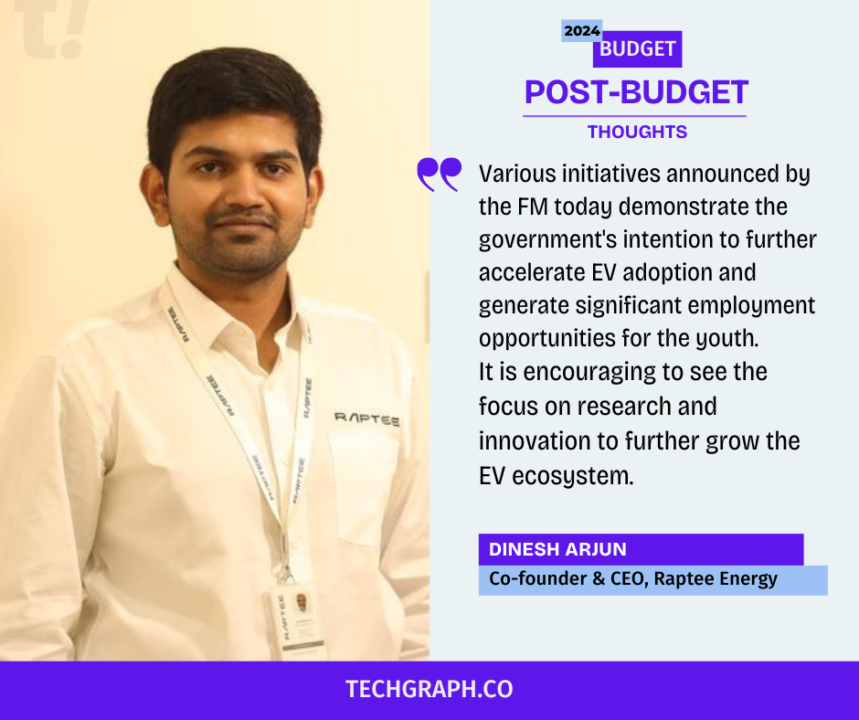
Various initiatives announced by the FM today demonstrate the government’s intention to further accelerate EV adoption and generate significant employment opportunities for the youth. It is encouraging to see the focus on research and innovation to further grow the EV ecosystem.
We believe that as the govt rolls out details of the scheme in the coming days for growing the EV public charging infrastructure, the availability of public chargers across the country will significantly grow and EV companies like ours will find higher market acceptance from its consumers and also attract investor interest. This will also break the ‘range anxiety’, the biggest barrier to EV adoption in our country.
The government’s support in providing financial assistance and support to EV manufacturing will encourage entrepreneurs to do deeper innovation in the battery management segment and other technologies. Growth in EV charging infra will also generate employment opportunities for the youth as companies will be on the lookout for people with the technical know-how of running and maintaining charging infra. EV companies will also enjoy a deeper vendor ecosystem providing battery and other components for building make-in-India EV vehicles.
Sumit Aneja, Founder, Speedways Electric
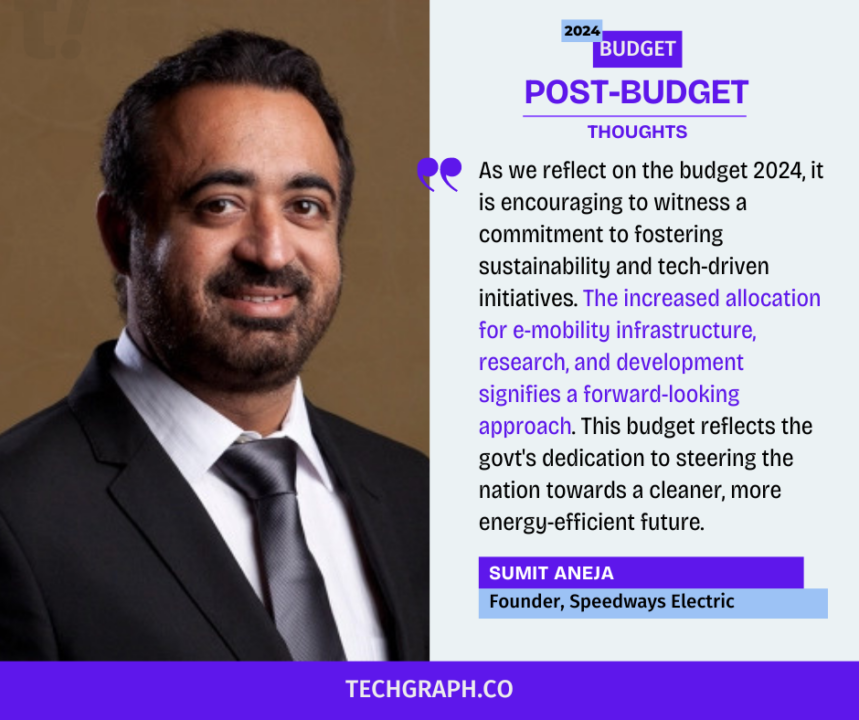
In the pursuit of a greener and more sustainable future, the greater adoption of e-buses within public transport networks emerges as a pivotal step. Not only do electric buses significantly reduce carbon emissions, but they also contribute to cleaner and quieter urban environments. To fortify the e-vehicle ecosystem, it is essential to focus on infrastructure development, battery technology advancements, and supportive policies.
One critical aspect that requires attention is the implementation of a robust payment security mechanism. As e-buses become more prevalent, ensuring secure and efficient payment systems will be vital for user convenience and trust. Integration of secure digital payment methods, encrypted transactions, and real-time monitoring will not only streamline the payment process but also safeguard user data.
As we reflect on the budget 2024, it is encouraging to witness a commitment to fostering sustainability and technology-driven initiatives. The increased allocation for e-mobility infrastructure, research, and development signifies a forward-looking approach. This budget reflects the government’s dedication to steering the nation towards a cleaner, more energy-efficient future. Together, with a strengthened e-vehicle ecosystem and enhanced payment security mechanisms, we can accelerate the transition towards sustainable urban transportation, benefitting both the environment and the well-being of our communities.
Maulik Manakiwala, Partner, Indirect Tax, BDO India
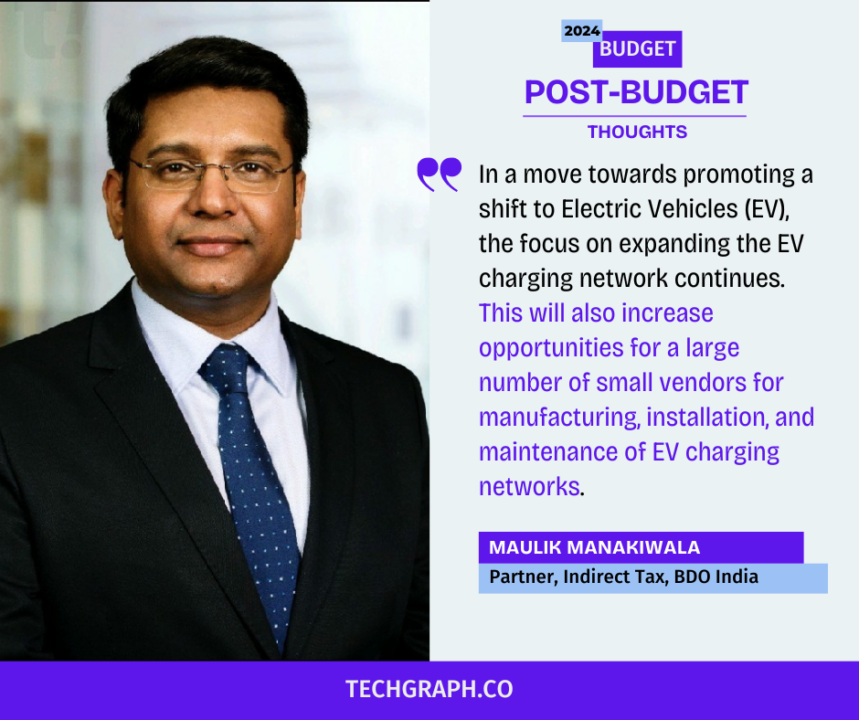
In a move towards promoting a shift to Electric Vehicles (EV), the focus on expanding the EV charging network continues. This will also increase opportunities for a large number of small vendors for manufacturing, installation, and maintenance of EV charging networks.
Chakravarthi C., Managing Director, Quantum Energy
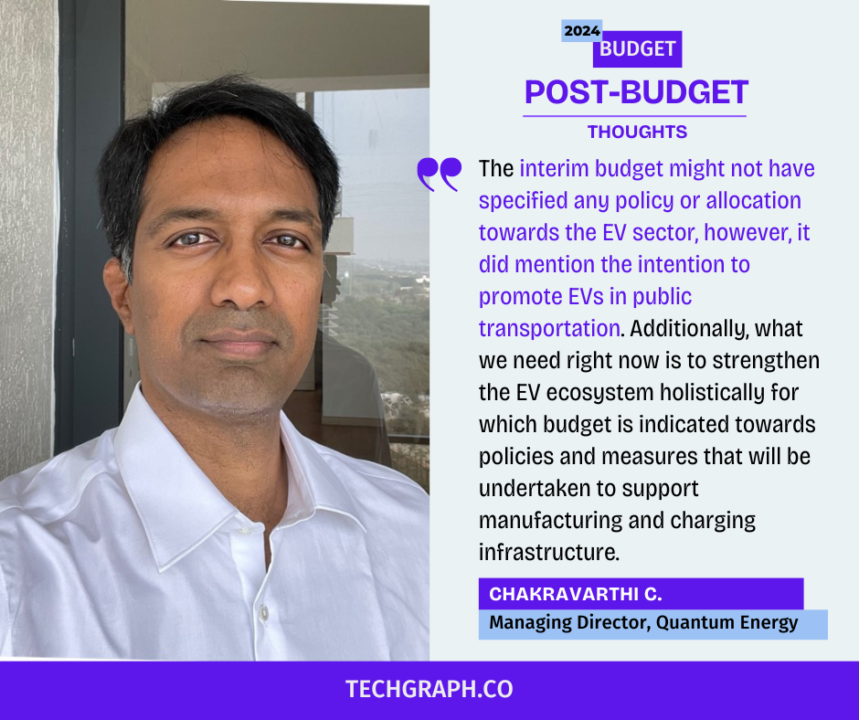
The interim budget might not have specified any policy or allocation towards the EV sector, however, it did mention the intention to promote EVs in public transportation. Additionally, what we need right now is to strengthen the EV ecosystem holistically for which budget is indicated towards policies and measures that will be undertaken to support manufacturing and charging infrastructure. EV stands on the priority list of the government and we can expect the upcoming FAME policy and August session to encompass all the particulars.
Parimal Heda, CIO, Digit Insurance
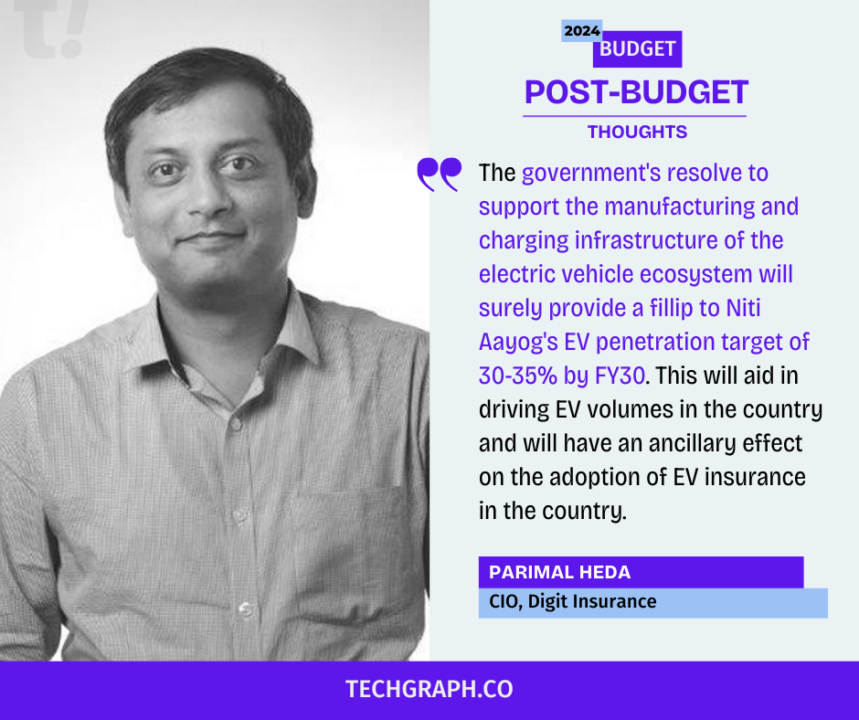
The government’s resolve to support the manufacturing and charging infrastructure of the electric vehicle ecosystem will surely provide a fillip to Niti Aayog’s EV penetration target of 30-35% by FY30. This will aid in driving EV volumes in the country and will have an ancillary effect on the adoption of EV insurance in the country.
The insurance industry is already well-prepared to meet this rising demand through the launch of EV-specific motor insurance coverage, providing adequate protection against the specific risks associated with EVs compared to Internal Combustion Engine (ICE) vehicles.
Hiranmay Mallick, CEO & Co-Founder, Tummoc
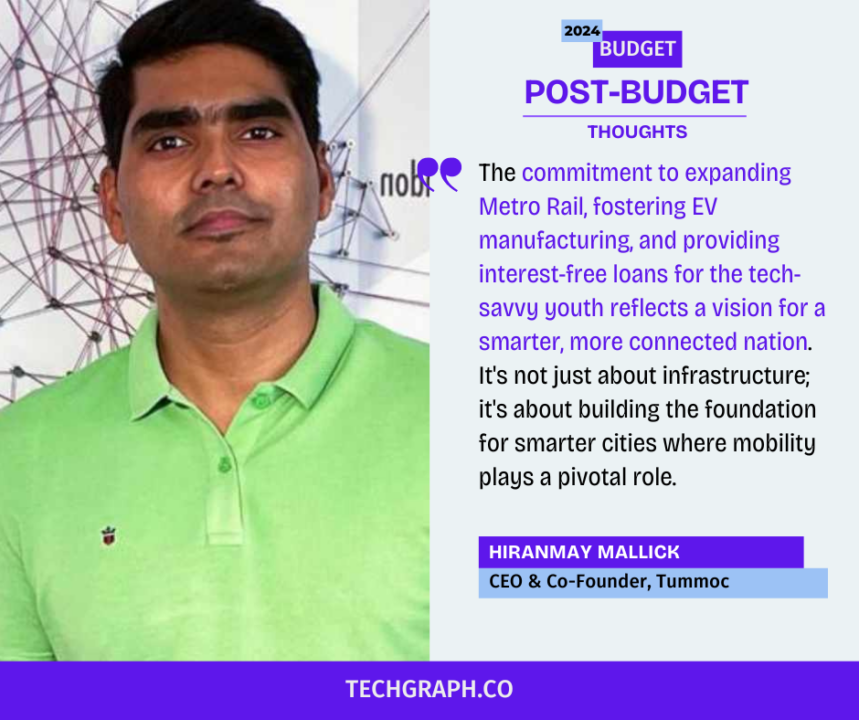
As we embark on this transformative journey outlined in the budget, I’m truly inspired by the emphasis on technology, youth empowerment, and sustainable development. The commitment to expanding Metro Rail, fostering EV manufacturing, and providing interest-free loans for the tech-savvy youth reflects a vision for a smarter, more connected nation. It’s not just about infrastructure; it’s about building the foundation for smarter cities where mobility plays a pivotal role. The focus on equipping and empowering the youth is not just an economic strategy; it’s a pathway to nation-building. In this new world order, where every form of infrastructure is being built at an unprecedented pace, the prosperity of our nation hinges on our ability to innovate, connect, and create a sustainable future.
These measures are catalysts that will drive our nation towards unparalleled development over the next five years and beyond, where accessibility, digital footprints, seamless payments, and policies become the driving force behind digitizing public transport.
Vimal Kumar, CEO & Co-Founder, Ionage Technologies
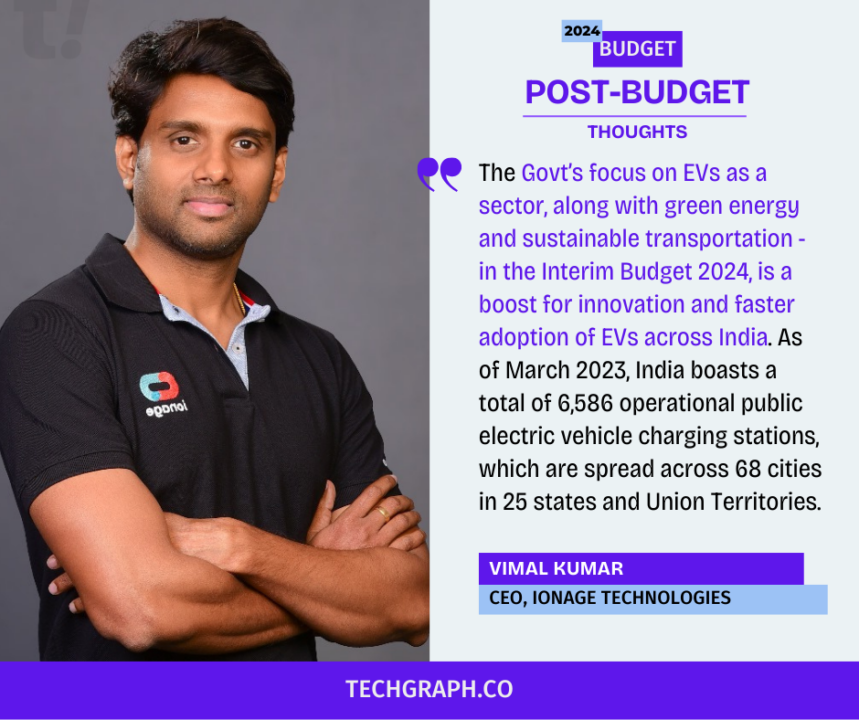
The Government’s focus on EVs as a sector, along with green energy and sustainable transportation – in the Interim Budget 2024, is a boost for innovation and faster adoption of EVs across India. As of March 2023, India boasts a total of 6,586 operational public electric vehicle (EV) charging stations, which are spread across 68 cities in 25 states and Union Territories.
In March 2023, the government sanctioned 2,877 electric vehicle charging stations, with 1,576 charging stations to be installed along 9 expressways and 16 highways, under phase II of the FAME India Scheme. And now, the Union Budget 2024 reiterates the government’s ongoing support to the sector, which will be valuable in achieving the goal of 30% EV penetration by 2030. The bold initiatives, particularly the rapid adoption of e-buses for public transport networks supported by a robust payment mechanism, signal a transformative phase. This not only fuels innovation but also catalyzes the expansion of a comprehensive EV charging infrastructure for public and private vehicles. This also aligns with our mission of democratizing EV charging accessibility.
Additionally, the Government’s emphasis on youth reskilling further amplifies the positive narrative. By endorsing vocational courses and nurturing research-oriented streams, it not only addresses talent gaps but also cultivates a generation ready to lead technological advancements in the EV and energy sectors. In essence, the Interim Budget 2024 paints a promising picture of the EV landscape, aligning seamlessly with our vision for a sustainable and technologically advanced future.
Abhinav Kalia, CEO & Co-founder, ARC Electric
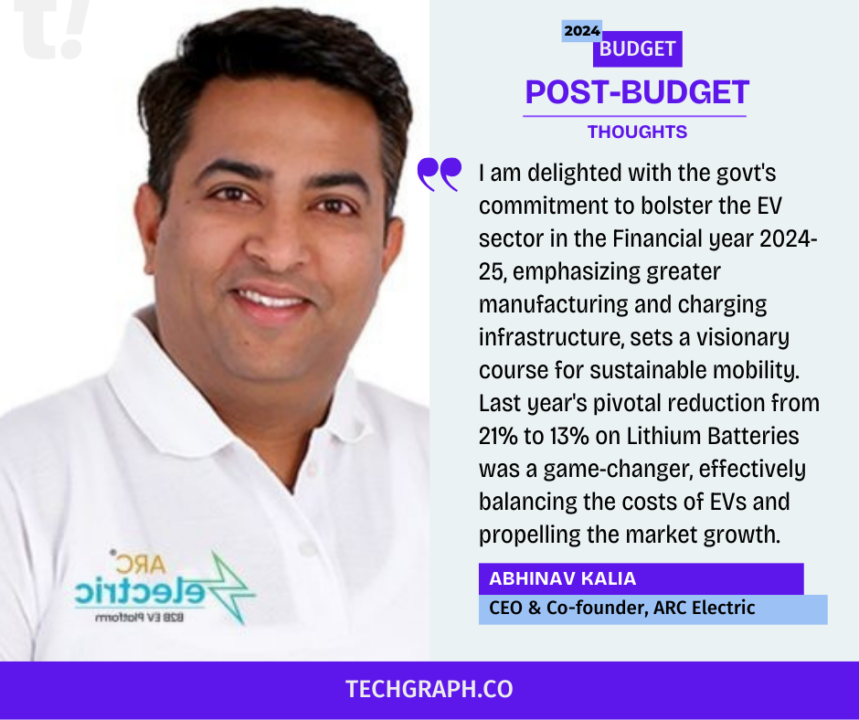
As an entrepreneur in the EV industry, I am delighted with the government’s commitment to bolster the E-vehicle sector in the Financial year 2024-25, emphasizing greater manufacturing and charging infrastructure, sets a visionary course for sustainable mobility. Last year’s pivotal reduction from 21% to 13% on Lithium Batteries was a game-changer, effectively balancing the costs of EVs and propelling the market growth.
We applaud this foresighted move, as it not only facilitated the affordability of electric vehicles but also strengthened the industry. With optimism, we anticipate and welcome forthcoming initiatives in the upcoming year, trusting that such strategic measures will continue to fuel the momentum for the EV sector.
This strategic focus aligns seamlessly with our mission at ARC Electric to revolutionize clean transportation. The impetus for expanding the EV sector fosters economic growth and accelerates our journey towards a greener future. As an industry leaders, ARC Electric looks forward to actively contributing to this transformative vision, driving innovation and accessibility in electric mobility for a more eco-conscious world.
Akihiro Ueda, CEO, Terra Charge

I am pleased with how the budget has promised to focus on EV manufacturing and develop EV charging infrastructure in the country and I believe the positive push would offer the much-needed push toward green mobility. Typically, the reduction of the GST compliance burden is a highlight of this budget.
Similarly, the government’s push to strengthen the EV charging network across the country through rooftop solarization projects is also commendable. I believe this would help EV charging infrastructure development companies to amp their charging and installation capacity and in turn address the root of range anxiety, promoting the adoption of electric vehicles across all segments.
Additionally, the reduction of GST compliance for trade and industry could ease the burden of EV entrepreneurs to some extent. However, I wish there were more announcements on the fronts of GST reforms to accelerate the growth of EV charging infrastructure and promote EV adoption in the country. While the budget’s emphasis on green mobility is commendable, I feel it missed an opportunity to uplift the EV sector’s niche segments, such as EV battery recycling.
Anjali Bansal, Founding Partner, Avaana Capital
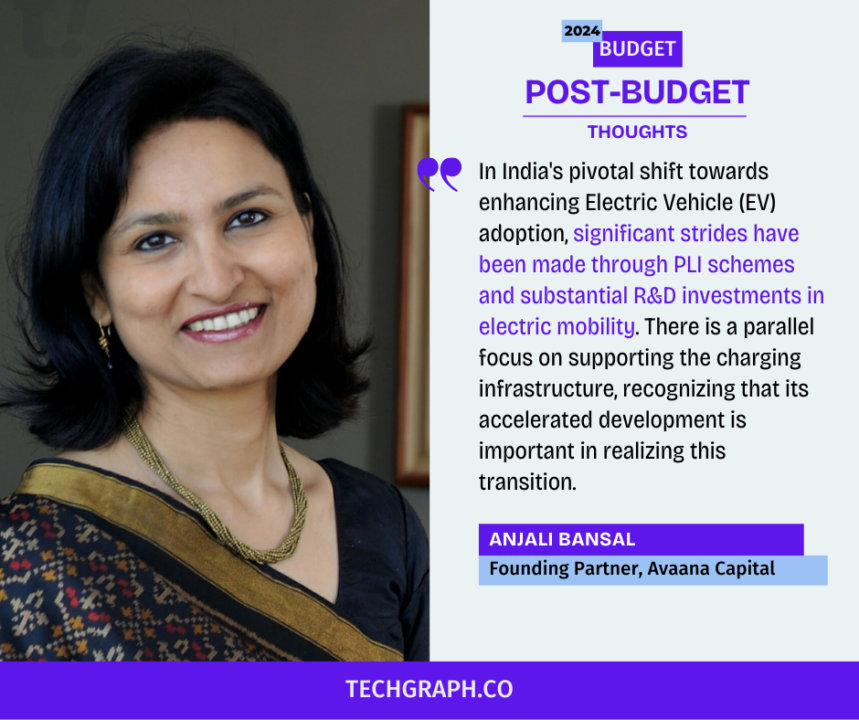
In India’s pivotal shift towards enhancing Electric Vehicle (EV) adoption, significant strides have been made through PLI schemes and substantial R&D investments in electric mobility. There is a parallel focus on supporting the charging infrastructure, recognizing that its accelerated development is important in realizing this transition. The emphasis lies in establishing interoperable, shared infrastructure adaptable across OEMs and diverse vehicle configurations and hardware. The government can continue to support a green fund facility to support innovation and indigenous technology solutions for climate action, particularly in adaptation and resilience building
Nehal Gupta Managing Director, Accelerated Money for U (AMU)

This year’s budget aims to boost the EV industry significantly by supporting EV manufacturing and charging infrastructure. Additionally, the drive to promote greater adoption of e-buses for increasing sustainable mobility is a commendable step. The hope for increased allocation for women entrepreneurs has made space tech startups and manufacturers hopeful for a boost in inclusivity and production.
However, I believe that the budget could have made more provisions to support the financing sector catering to EV and drone funding needs. Giving the priority sector lending status to the EV financing segment could have further accelerated the nation’s green transitions as NBFCs and fintechs offering finance to electric automakers and consumers play a vital role in driving the change.
Pragya Goyal, CEO & Co-Founder, Vegh Automobiles
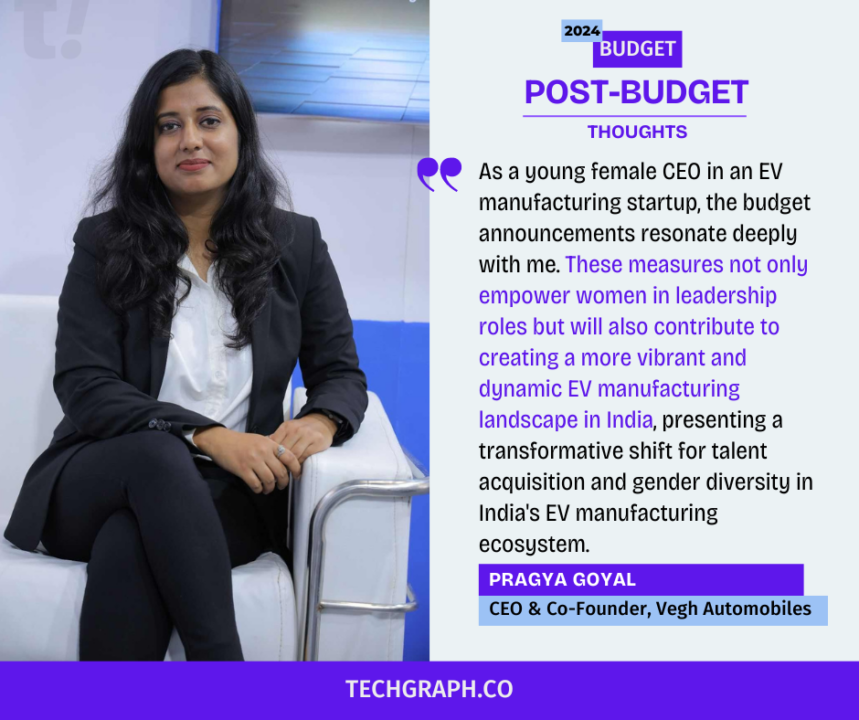
The infusion of thirty crore Mudra Yojana loans into the hands of women entrepreneurs is a game-changer, providing financial backing for aspiring female leaders to venture into the dynamic field of electric vehicle manufacturing. The commendable twenty-eight percent surge in female enrolment in higher education, particularly in STEM courses, fortifies the talent pool for the EV sector. As a young female CEO in an EV manufacturing startup, the budget announcements resonate deeply with me. These measures not only empower women in leadership roles but will also contribute to creating a more vibrant and dynamic EV manufacturing landscape in India, presenting a transformative shift for talent acquisition and gender diversity in India’s EV manufacturing ecosystem.
The emphasis on bolstering the EV ecosystem aligns seamlessly with our vision for a sustainable and eco-friendly mobility landscape. The move towards net zero emissions by 2070 is not only a commendable environmental goal but also a strategic boost for the EV sector. The planned expansion of manufacturing will likely lead to increased production capacities, fostering innovation and competitiveness. Moreover, the focus on charging infrastructure development is pivotal, addressing a critical aspect that has often been a consideration for potential EV adopters. As a manufacturer, we anticipate these initiatives will significantly contribute to the growth of the electric vehicle market in India, making sustainable mobility more accessible and attractive to a broader consumer base.
Varun Chandran, COO & Co-Founder, Ionage Technologies
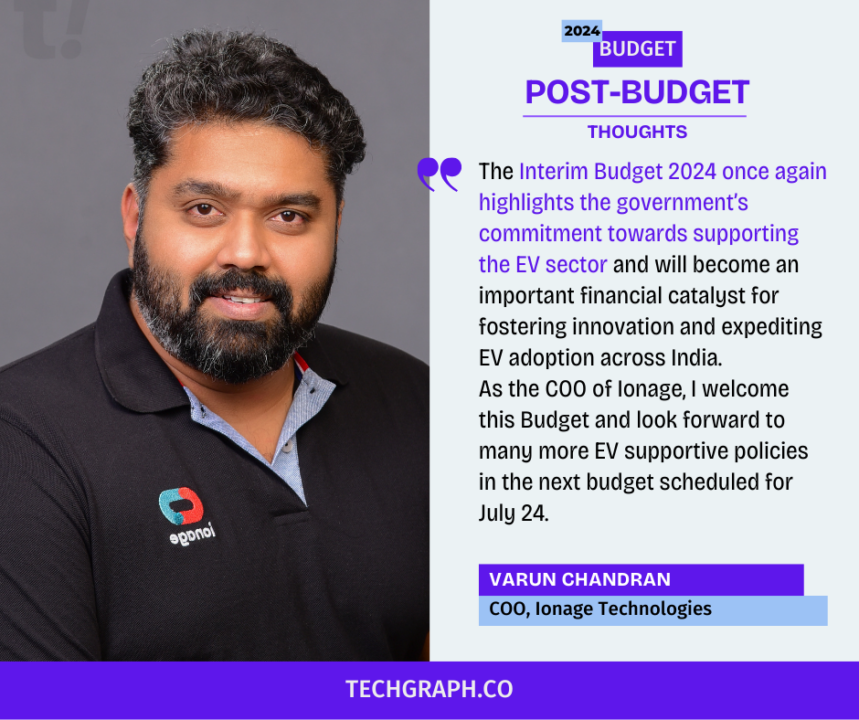
The Interim Budget 2024 once again highlights the government’s commitment towards supporting the EV sector and will become an important financial catalyst for fostering innovation and expediting EV adoption across India.
The budget’s reinforcement of EV infrastructure development, with 2,877 charging stations approved in March 2023 and ongoing support, aligns with our financial mission to drive sustainable and technologically advanced solutions. The transformative initiatives, notably the integration of e-buses with a robust payment mechanism, is a leap forward, making EV’s a part of everyday utility for the masses.
As the COO of Ionage, I welcome this Budget and look forward to many more EV supportive policies in the next budget scheduled for July 24.
Rajat Jaiswal, Co-founder & CEO, Keydroid
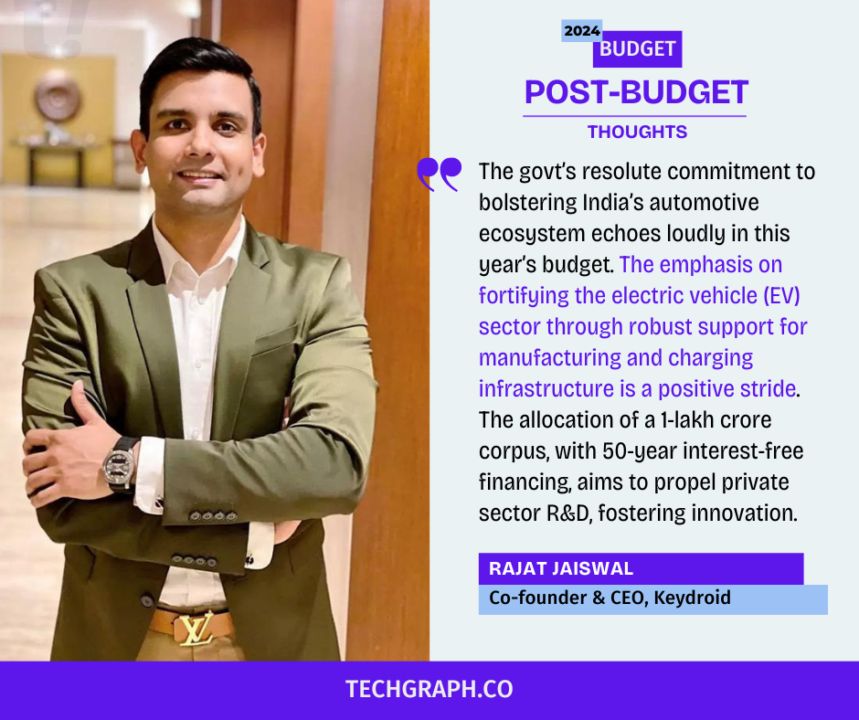
The government’s resolute commitment to bolstering India’s automotive ecosystem echoes loudly in this year’s budget. The emphasis on fortifying the electric vehicle (EV) sector through robust support for manufacturing and charging infrastructure is a positive stride. The allocation of a 1-lakh crore corpus, with 50-year interest-free financing, aims to propel private sector R&D, fostering innovation. Extending tax benefits to startups until March 31, 2025, emphasizes a supportive environment for entrepreneurial ventures. While this interim budget recognizes the transformative shift in the automotive sector, we await full budget policies post general elections to address the evolving landscape comprehensively, ensuring sustained growth for consumers, OEMs and suppliers.



